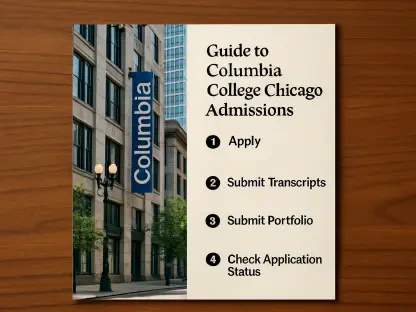Higher education stands at a critical crossroads, grappling with intense ideological battles that shape campus culture and student experiences in profound ways. Recent data reveals a stark reality: a significant percentage of students feel unsafe expressing their views on controversial topics due to fear of backlash, and this alarming trend, coupled with rising campus unrest tied to global conflicts, raises a pressing question about fostering inclusive environments. How can universities create spaces where diverse beliefs are not just tolerated but actively embraced? This roundup gathers insights, opinions, and strategies from a range of educators, administrators, and policy experts to explore why ideological inclusion is essential in academia and how it can be practically achieved.
Gathering Voices on Ideological Inclusion in Academia
A growing chorus of academic leaders has sounded the alarm on the state of American universities, pointing to social unrest and political polarization as barriers to true learning. Many argue that campuses have become battlegrounds for ideological conflicts rather than sanctuaries for open discourse. Experts with decades of experience in university administration emphasize that failing to address this issue risks alienating students and undermining trust in higher education as a societal pillar.
Another perspective highlights the urgency of this challenge in light of specific campus incidents, such as protests linked to international disputes. These events have often escalated into safety concerns, prompting some administrators to call for stricter policies to maintain order. The consensus among these voices is clear: without a commitment to diversity of beliefs, universities cannot fulfill their mission of preparing students for a complex world.
The discussion also previews a deeper dive into why intellectual diversity matters, how it aligns with the core purpose of academia, and what actionable steps can be taken to create inclusive environments. By synthesizing varied opinions, this exploration aims to provide a comprehensive view of a multifaceted issue facing higher education today.
Exploring the Need for Diverse Perspectives on Campus
Addressing the Consequences of Ideological Polarization
Campus environments have increasingly become arenas for political activism, often sidelining their primary role as spaces for education. Many experts note that protests, while a valid form of expression, can compromise safety and learning when they turn disruptive, as seen in recent clashes over global issues. This tension has led to widespread calls for universities to better manage such situations without stifling free speech.
Specific cases, including multimillion-dollar legal settlements for failing to protect certain student groups, underscore the tangible consequences of neglecting ideological diversity. Administrators who have witnessed these challenges firsthand argue that ignoring diverse viewpoints has led to environments where some students feel marginalized or unsafe. This failure not only impacts campus culture but also invites external scrutiny and intervention.
Balancing the right to protest with the need to safeguard all students remains a contentious issue. Some policy analysts advocate for clear guidelines that prioritize safety while preserving expression, while others caution against overly restrictive measures that could chill discourse. This debate reveals the complexity of fostering an inclusive campus amid deep societal divisions.
Reassessing the Fundamental Mission of Universities
Historically, universities have been tasked with shaping engaged citizens, a role that some educators believe has been overshadowed by a modern focus on workforce preparation for lucrative careers. Several thought leaders push for a return to curricula that emphasize history and civics to cultivate a broader societal understanding among students. This shift, they argue, is vital for maintaining academia’s relevance.
Balancing the needs of a diverse student body, including a large international population alongside domestic and underrepresented groups, adds another layer of complexity. Experts in higher education policy suggest that inclusivity must extend beyond demographics to encompass ideological perspectives, ensuring all voices contribute to campus dialogue. This approach could help rebuild trust in universities as institutions of public good.
The risk of losing societal confidence looms large if academia fails to refocus on citizenship and inclusivity. Some observers warn that without this realignment, universities may be seen as elitist enclaves disconnected from broader community needs. Opportunities exist, however, to redefine their purpose through innovative programs that encourage critical thinking across ideological lines.
Tackling the Risk of Intellectual Uniformity
A significant concern among academic circles is the trend toward campuses becoming echo chambers where singular narratives dominate. Many educators describe this as a dangerous slide into intellectual homogeneity, stifling the robust debate essential for academic growth. They argue that such environments limit students’ exposure to challenging ideas, hindering personal and intellectual development.
Regional differences in how this conformity manifests have also been noted, with some areas showing more openness to dialogue than others. Looking ahead, proponents of change see potential in structured forums and policies that actively encourage diverse thought as a countermeasure to polarization. These measures could serve as a blueprint for campuses nationwide.
There is also a common misconception that demographic diversity alone is sufficient for a vibrant academic community. Critics of this view assert that without diversity of thought, universities cannot achieve meaningful progress or prepare students for real-world complexities. This perspective challenges institutions to prioritize ideological inclusion as a core value.
Navigating Academic Freedom and Accountability
The delicate balance between academic freedom and responsibility remains a hotly debated topic among university stakeholders. Incidents of staff facing hostility during campus protests highlight the need for accountability alongside the right to express dissenting views. Many administrators stress that freedom without structure can lead to chaos, undermining the educational mission.
Insights from seasoned university leaders suggest that past approaches to managing crises often lacked the foresight needed for today’s challenges. They propose future frameworks that prioritize neutrality, ensuring campuses remain spaces for debate rather than arenas for disruption. Such strategies could help maintain a safe environment for all students.
Responsibility, as some experts argue, enhances rather than restricts freedom by setting boundaries that protect the community. This principle ensures universities avoid favoring one ideology over another, fostering an atmosphere where diverse beliefs can coexist. The emphasis on neutrality could serve as a guiding light for institutions navigating turbulent times.
Synthesizing Key Opinions and Strategies for Inclusive Campuses
Drawing from a wide array of perspectives, several critical insights emerge on the state of higher education. The failure to manage campus unrest effectively has exposed gaps in administrative preparedness, while the drift from civic education has weakened universities’ societal role. Most importantly, the urgency of embracing diverse beliefs to prevent ideological silos resonates across all viewpoints.
Practical strategies to address these challenges include implementing robust policies to protect all students, regardless of their views or backgrounds. Integrating civics and history into core curricula is another widely supported idea, aimed at equipping students with tools for informed engagement. Additionally, creating regular forums for open dialogue across differing perspectives is seen as a way to rebuild trust and foster understanding.
Educators, students, and policymakers are encouraged to advocate for reforms that prioritize intellectual diversity. Whether through policy changes, curriculum adjustments, or campus initiatives, the collective push for inclusivity can reshape academic communities. These actionable steps offer a starting point for those committed to driving change within their institutions.
Reflecting on a Path Forward for Higher Education
Looking back on the discussions and insights gathered, it becomes evident that embracing diversity of beliefs is not merely an ideal but a fundamental necessity for universities to uphold their role as societal cornerstones. The varied opinions underscored a shared concern about ideological polarization and its impact on campus culture, highlighting a collective yearning for reform.
Moving forward, stakeholders are urged to consider innovative partnerships between universities and community organizations to promote dialogue on contentious issues. Exploring funding models that incentivize programs focused on intellectual diversity also emerged as a potential solution. These steps aim to ensure that higher education remains a beacon of learning for future generations, capable of navigating global and domestic tensions with resilience and inclusivity.









